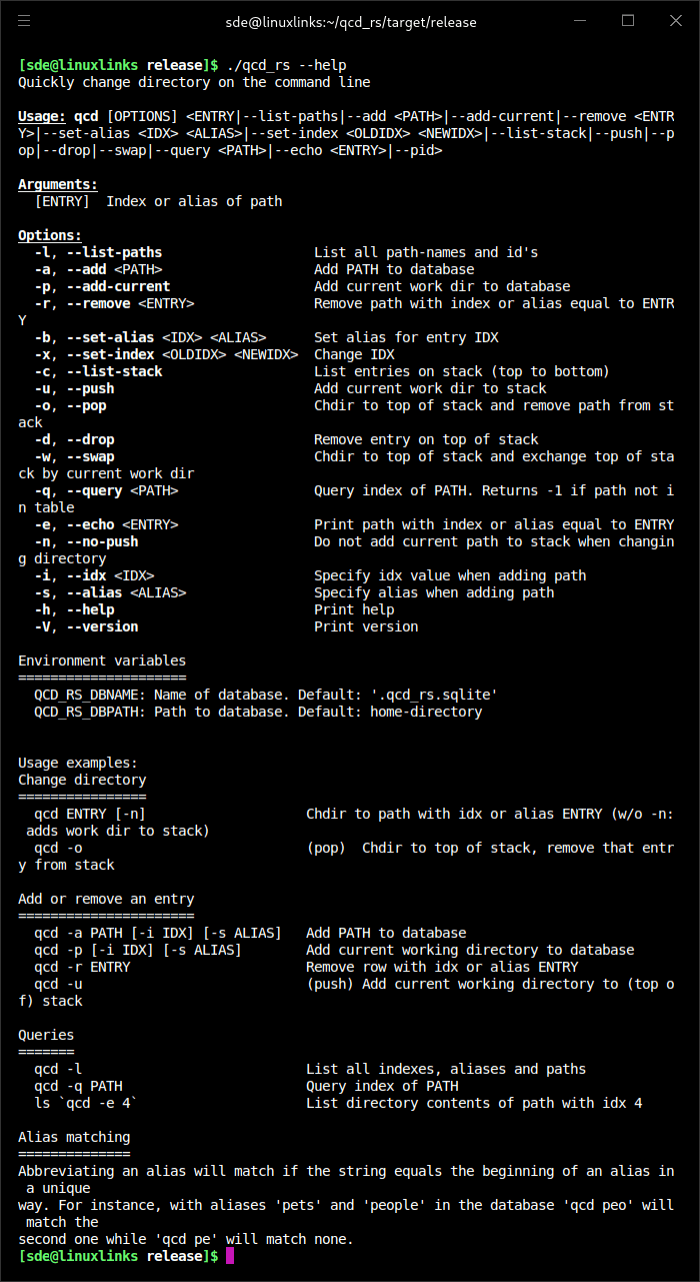qcd is a utility which lets you quickly change directory on the command line. It aims to improve your efficiency.
With qcd you change to another directory just by entering commands like qcd 3 and step back to where you came from with qcd -o>. Or you toggle between two directories with the swap functionality qcd -w.
For this to work you store frequently visited directories in a database file (sqlite3). Entries in this database get referred to via indices (value ‘3’ in the example). If you don’t like remembering indices you can assign aliases to each entry. Indices and aliases can be freely adjusted to your needs.
In addition, qcd provides a stack concept. In the example (qcd 3) the current working directory is put on (top of) the stack before changing the directory. Entering qcd -o pops (removes) the path from top of the stack and changes the working directory to that path.
This is free and open source software.
Website: github.com/ClaasBontus/qcd_rs
Support:
Developer: Claas Bontus
License: MIT License or Apache 2.0 License

qcd is written in Rust. Learn Rust with our recommended free books and free tutorials
Return to CLI Navigation Tools
| Popular series | |
|---|---|
| The largest compilation of the best free and open source software in the universe. Each article is supplied with a legendary ratings chart helping you to make informed decisions. | |
| Hundreds of in-depth reviews offering our unbiased and expert opinion on software. We offer helpful and impartial information. | |
| The Big List of Active Linux Distros is a large compilation of actively developed Linux distributions. | |
| Replace proprietary software with open source alternatives: Google, Microsoft, Apple, Adobe, IBM, Autodesk, Oracle, Atlassian, Corel, Cisco, Intuit, and SAS. | |
| Awesome Free Linux Games Tools showcases a series of tools that making gaming on Linux a more pleasurable experience. This is a new series. | |
| Machine Learning explores practical applications of machine learning and deep learning from a Linux perspective. We've written reviews of more than 40 self-hosted apps. All are free and open source. | |
| New to Linux? Read our Linux for Starters series. We start right at the basics and teach you everything you need to know to get started with Linux. | |
| Alternatives to popular CLI tools showcases essential tools that are modern replacements for core Linux utilities. | |
| Essential Linux system tools focuses on small, indispensable utilities, useful for system administrators as well as regular users. | |
| Linux utilities to maximise your productivity. Small, indispensable tools, useful for anyone running a Linux machine. | |
| Surveys popular streaming services from a Linux perspective: Amazon Music Unlimited, Myuzi, Spotify, Deezer, Tidal. | |
| Saving Money with Linux looks at how you can reduce your energy bills running Linux. | |
| Home computers became commonplace in the 1980s. Emulate home computers including the Commodore 64, Amiga, Atari ST, ZX81, Amstrad CPC, and ZX Spectrum. | |
| Now and Then examines how promising open source software fared over the years. It can be a bumpy ride. | |
| Linux at Home looks at a range of home activities where Linux can play its part, making the most of our time at home, keeping active and engaged. | |
| Linux Candy reveals the lighter side of Linux. Have some fun and escape from the daily drudgery. | |
| Getting Started with Docker helps you master Docker, a set of platform as a service products that delivers software in packages called containers. | |
| Best Free Android Apps. We showcase free Android apps that are definitely worth downloading. There's a strict eligibility criteria for inclusion in this series. | |
| These best free books accelerate your learning of every programming language. Learn a new language today! | |
| These free tutorials offer the perfect tonic to our free programming books series. | |
| Linux Around The World showcases usergroups that are relevant to Linux enthusiasts. Great ways to meet up with fellow enthusiasts. | |
| Stars and Stripes is an occasional series looking at the impact of Linux in the USA. | |

Wow, but QCD takes SOOOOO much longer to type than ‘z’ or zi’ innit?
Use an alias…
I find some of the Linux jargon to be confusing. What does an alias mean?
An alias is simply a replacement string that references a Linux command and produces the same results as when executing the original command.
To make an alias permanent, an entry is saved in a shell configuration file.